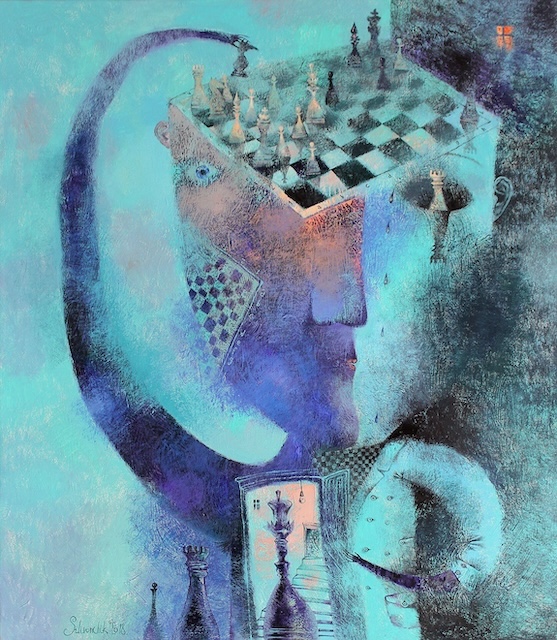
As you go deeper into the heart, the mirror becomes clearer and cleaner.
–Rumi
Carl Gustave Jung, the renowned psychiatrist and psychanalyst defines the inner dialogue as an essential tool of human beings. Often heard at times of inner conflict, it is the precursor of a decision, and propels the self to discern good from bad. Instantaneously sparking self-reflective activity in the mental-psychic fronts, it tends to generate action.
The eminent child psychologist D.W. Winnicott defines it as an essential part of development of the “selfhood”. He says:
The conversation takes place in the space between fantasy and reality where one feels vigilant with a particular sense of being.
As one cruises the unconscious and the conscious zones, the different parts of oneself which are not ordinarily accessible unfold. The sense of time dissipates, and past, present and future selves merge into “oneness. ” Among the instantaneous currents of emotions and thoughts circulating the psyche, ones identified as relevant and useful are kept whereas others are ignored or discarded. In this state of vigilant awareness, one engages in self-analytical inner talk. Self-knowledge amassed during this analysis is projected onto future self, who is warranted to draw a decision and plan subsequent action.

Jung describes inner talk “ as essentially human ” known by all human beings :
Everyone knows it, for it is particular for each person and each has an aptitude to converse with himself… Every time a person is plunged into an agonizing dilemma, he asks himself the question: “What should I do ? ” he gives himself the answer. […] Our inner voice can drop the mask we wear in public which conceals our true nature.
Inner dialogue habitually takes place between the ego-imperious self and the voice of our inner guide. It gets louder as the internal conflict heightens. Ultimately, the self has to choose a side, make a decision and put it into action.
The ego’s voice, by nature is louder as it tends to dominate. Yet the voice of the inner guide may occasionally become more salient. Only on such occasions the inner guide can relinquish the authentic deeper self from the engulfment of social milieu, media, etc., and encourages one to “exist in a singular position.” In these brief moments of detachment from the dominating whims of the ego and the infusing external influences, “ the imperiously impulsive thoughts and desires of the ego ” once entertained can be silenced and left aside. We listen to what our inner guide has to say.
Yet, we are not always aware of the surmounting contradictory emotions or the impulses driving us into action. In moments of mind-blowing turbulence, emotions are often conflictual and mixed up. The ego urges to rule and imposes an action plan that suits its immediate needs arising from pride, revenge, victory, power, lust, etc. It aims to override the voice of the inner guide who inculcates to do what is humane and ethically correct. The challenge is to distinguish the voice of ego from the subtle voice of the inner guide because the shrewd ego can take on many visages, or else it can be insidiously disguised and deceptive.
A colleague of mine who is perceived by the majority to consider herself superior to others, one day asked me to help her write a crucial report which had to be submitted to court. She justified her demand by saying that she had never written one and that our work entailed different characters of the same case anyhow; so she said that I might as well give it to her in full written format. Dazed by her demand, I plunged into an inner dialogue :
– How can she recklessly ask for my report ? It should be kept confidential and she knows it very well.
– Come on. You are working on the same case. She will see it in the end anyway…
– Yes but the job requires that we approach it individually. She can read my report upon closure but not now.
– If she cannot write it on time, it may have serious consequences for her and also for the third parties.
– She was playing so high and mighty and now suddenly she is playing for sympathy. Why should I give in to that façade ?
– Hey hold on your judgments ! Be tolerant. Give her benefit of doubt. You don’t know for certain what is at stake for her. Yet you won’t lose ground or compromise your standing if you give her a hand.
– I am not responsible if she is not apt for the specific job, I cannot fill in for her. Besides, I suggested that I could help her verbally on the format without giving mine. But she insists.
– Maybe you can make an exception for this case considering its legal repercussions. She does not ask you to write it for her, she just wants to see yours as an example. You are exaggerating. What can go wrong ?
– You never know the other’s exact intention. In any event, I am absolutely sure she would not do the same favor for me or for any other colleague. Besides there is the confidentiality issue. I cannot assess the risk of violation.
– Ok fine … If you were in her shoes, and your plea for help to complete your job have been turned down, how would you feel ?
Immersed in this dialogue between the inner guide and the ego, I may give her the report to ease my conscience, and to overcome any residues of revenge I have grown against her over time. Besides, it would serve me well to avoid conflict which I personally dread. I would also avoid further hassle and end up spending less effort. Or I may choose not to give it based on the arguments that I should defend my right, respect confidentiality and the common right of other parties. In that case, I would be accepting to spend more time and effort to resolve the conflict that will arise in addition to other case-specific demands. In such a state of dilemma, it is not so easy for me to immediately discern right from wrong or to choose a side with a lucid mind. Both options require rigorous analysis of self and context. In order to reach a correct and truthful decision, I need to be able to see through the noise and fog of my ego. I can only do this by willing and making an effort to confront the not so bright parts of myself bearing the intention to kindle the better.
Duygu Bruce







